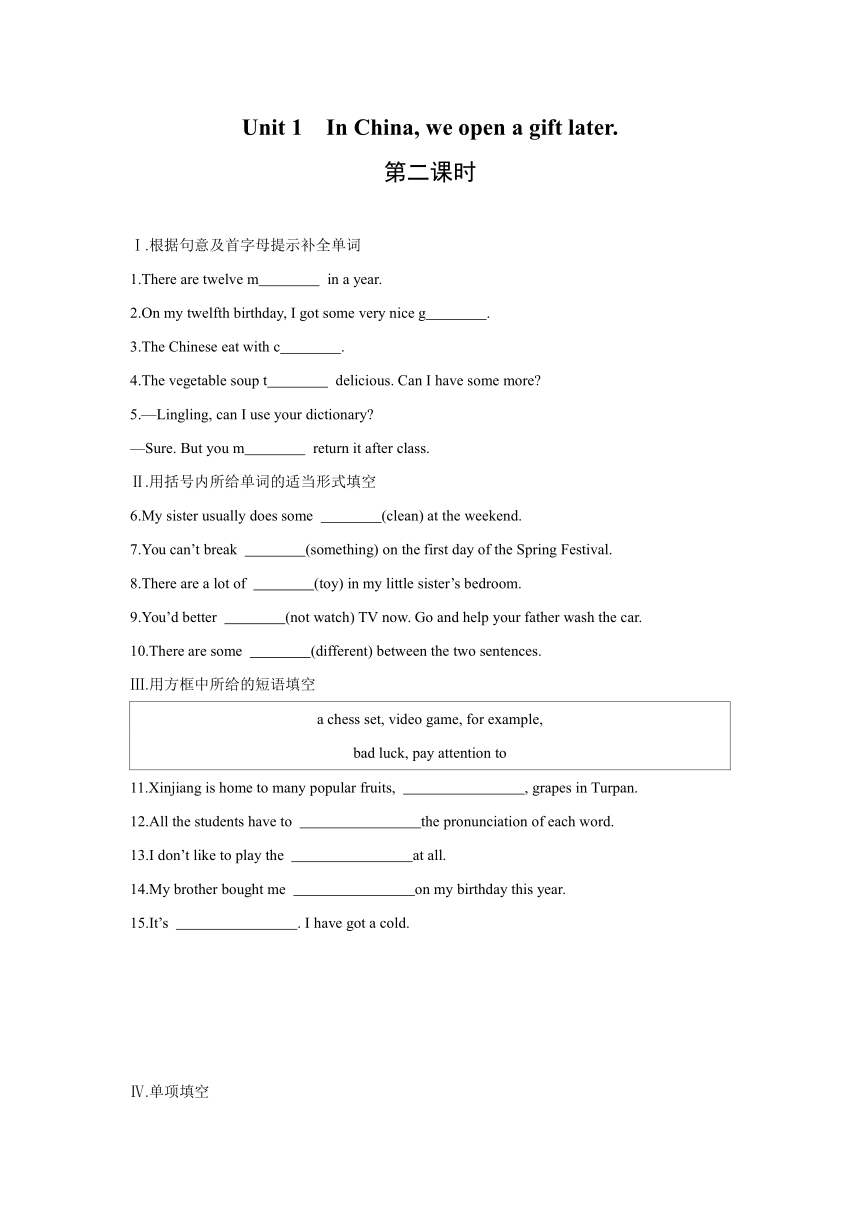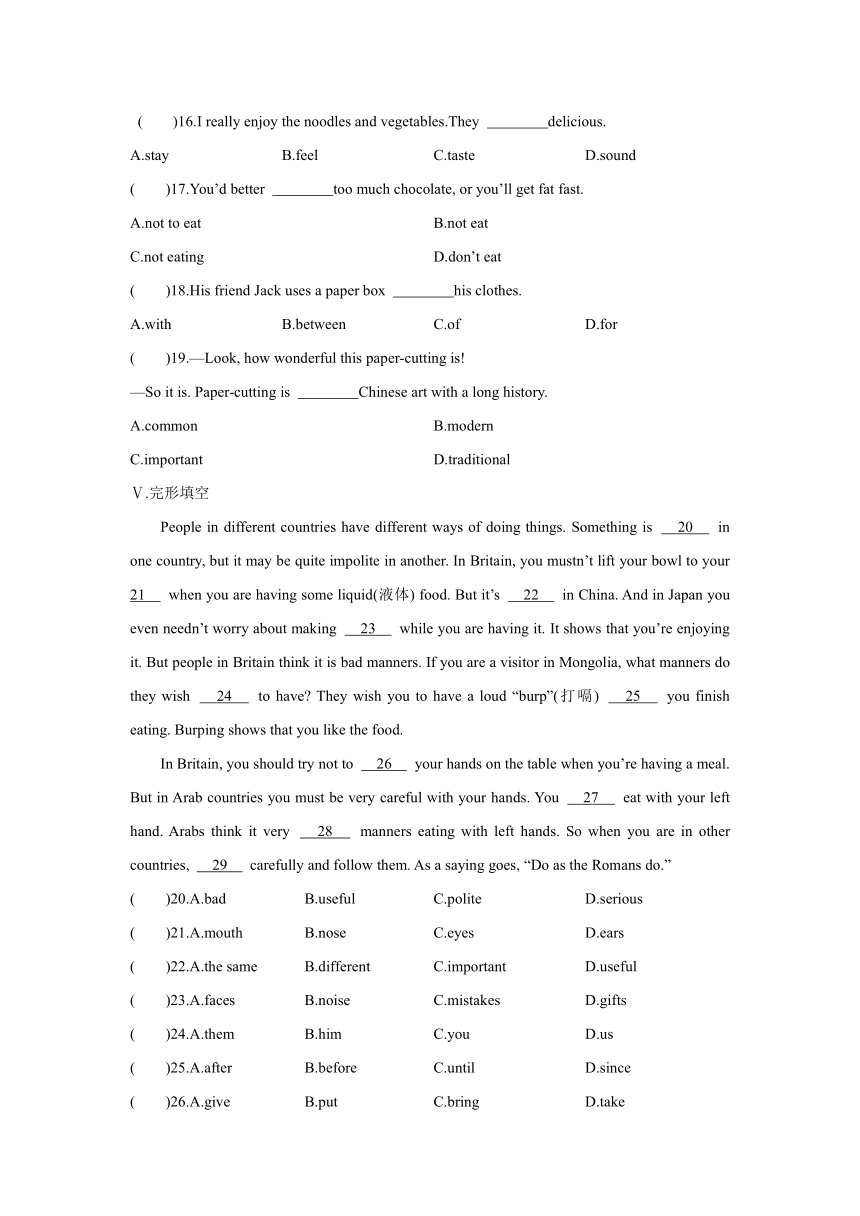Module 11 Unit 1 In China, we open a gift later 第二课时(word版,含答案)
文档属性
| 名称 | Module 11 Unit 1 In China, we open a gift later 第二课时(word版,含答案) |

|
|
| 格式 | docx | ||
| 文件大小 | 40.8KB | ||
| 资源类型 | 教案 | ||
| 版本资源 | 外研版 | ||
| 科目 | 英语 | ||
| 更新时间 | 2022-06-09 06:34:11 | ||
图片预览


文档简介
Unit 1 In China, we open a gift later.
第二课时
Ⅰ.根据句意及首字母提示补全单词
1.There are twelve m in a year.
2.On my twelfth birthday, I got some very nice g .
3.The Chinese eat with c .
4.The vegetable soup t delicious. Can I have some more
5.—Lingling, can I use your dictionary
—Sure. But you m return it after class.
Ⅱ.用括号内所给单词的适当形式填空
6.My sister usually does some (clean) at the weekend.
7.You can’t break (something) on the first day of the Spring Festival.
8.There are a lot of (toy) in my little sister’s bedroom.
9.You’d better (not watch) TV now. Go and help your father wash the car.
10.There are some (different) between the two sentences.
Ⅲ.用方框中所给的短语填空
a chess set, video game, for example,
bad luck, pay attention to
11.Xinjiang is home to many popular fruits, , grapes in Turpan.
12.All the students have to the pronunciation of each word.
13.I don’t like to play the at all.
14.My brother bought me on my birthday this year.
15.It’s . I have got a cold.
Ⅳ.单项填空
( )16.I really enjoy the noodles and vegetables.They delicious.
A.stay B.feel C.taste D.sound
( )17.You’d better too much chocolate, or you’ll get fat fast.
A.not to eat B.not eat
C.not eating D.don’t eat
( )18.His friend Jack uses a paper box his clothes.
A.with B.between C.of D.for
( )19.—Look, how wonderful this paper-cutting is!
—So it is. Paper-cutting is Chinese art with a long history.
A.common B.modern
C.important D.traditional
Ⅴ.完形填空
People in different countries have different ways of doing things. Something is 20 in one country, but it may be quite impolite in another. In Britain, you mustn’t lift your bowl to your 21 when you are having some liquid(液体) food. But it’s 22 in China. And in Japan you even needn’t worry about making 23 while you are having it. It shows that you’re enjoying it. But people in Britain think it is bad manners. If you are a visitor in Mongolia, what manners do they wish 24 to have They wish you to have a loud “burp”(打嗝) 25 you finish eating. Burping shows that you like the food.
In Britain, you should try not to 26 your hands on the table when you’re having a meal. But in Arab countries you must be very careful with your hands. You 27 eat with your left hand. Arabs think it very 28 manners eating with left hands. So when you are in other countries, 29 carefully and follow them. As a saying goes, “Do as the Romans do.”
( )20.A.bad B.useful C.polite D.serious
( )21.A.mouth B.nose C.eyes D.ears
( )22.A.the same B.different C.important D.useful
( )23.A.faces B.noise C.mistakes D.gifts
( )24.A.them B.him C.you D.us
( )25.A.after B.before C.until D.since
( )26.A.give B.put C.bring D.take
( )27.A.needn’t B.mustn’t C.may not D.might not
( )28.A.good B.strange C.bad D.quiet
( )29.A.listen B.do C.watch D.think
答案
Ⅰ.1.months 2.gifts 3.chopsticks
4.tastes 5.must
Ⅱ.6.cleaning 7.anything 8.toys
9.not watch 10.differences
Ⅲ.11.for example 12.pay attention to
13.video game 14.a chess set
15.bad luck
Ⅳ.16.C 考查系动词。根据第一句“我非常喜欢这些面条和蔬菜”可知,它们尝起来很美味。
17.B had better后跟动词原形,意为“最好做某事”,其否定形式为had better not do sth.。
18.D “use sth. for …”是固定句式,意为“用……来做……”。
19.D
Ⅴ.20—24 CABBC 25—29 ABBCC
第二课时
Ⅰ.根据句意及首字母提示补全单词
1.There are twelve m in a year.
2.On my twelfth birthday, I got some very nice g .
3.The Chinese eat with c .
4.The vegetable soup t delicious. Can I have some more
5.—Lingling, can I use your dictionary
—Sure. But you m return it after class.
Ⅱ.用括号内所给单词的适当形式填空
6.My sister usually does some (clean) at the weekend.
7.You can’t break (something) on the first day of the Spring Festival.
8.There are a lot of (toy) in my little sister’s bedroom.
9.You’d better (not watch) TV now. Go and help your father wash the car.
10.There are some (different) between the two sentences.
Ⅲ.用方框中所给的短语填空
a chess set, video game, for example,
bad luck, pay attention to
11.Xinjiang is home to many popular fruits, , grapes in Turpan.
12.All the students have to the pronunciation of each word.
13.I don’t like to play the at all.
14.My brother bought me on my birthday this year.
15.It’s . I have got a cold.
Ⅳ.单项填空
( )16.I really enjoy the noodles and vegetables.They delicious.
A.stay B.feel C.taste D.sound
( )17.You’d better too much chocolate, or you’ll get fat fast.
A.not to eat B.not eat
C.not eating D.don’t eat
( )18.His friend Jack uses a paper box his clothes.
A.with B.between C.of D.for
( )19.—Look, how wonderful this paper-cutting is!
—So it is. Paper-cutting is Chinese art with a long history.
A.common B.modern
C.important D.traditional
Ⅴ.完形填空
People in different countries have different ways of doing things. Something is 20 in one country, but it may be quite impolite in another. In Britain, you mustn’t lift your bowl to your 21 when you are having some liquid(液体) food. But it’s 22 in China. And in Japan you even needn’t worry about making 23 while you are having it. It shows that you’re enjoying it. But people in Britain think it is bad manners. If you are a visitor in Mongolia, what manners do they wish 24 to have They wish you to have a loud “burp”(打嗝) 25 you finish eating. Burping shows that you like the food.
In Britain, you should try not to 26 your hands on the table when you’re having a meal. But in Arab countries you must be very careful with your hands. You 27 eat with your left hand. Arabs think it very 28 manners eating with left hands. So when you are in other countries, 29 carefully and follow them. As a saying goes, “Do as the Romans do.”
( )20.A.bad B.useful C.polite D.serious
( )21.A.mouth B.nose C.eyes D.ears
( )22.A.the same B.different C.important D.useful
( )23.A.faces B.noise C.mistakes D.gifts
( )24.A.them B.him C.you D.us
( )25.A.after B.before C.until D.since
( )26.A.give B.put C.bring D.take
( )27.A.needn’t B.mustn’t C.may not D.might not
( )28.A.good B.strange C.bad D.quiet
( )29.A.listen B.do C.watch D.think
答案
Ⅰ.1.months 2.gifts 3.chopsticks
4.tastes 5.must
Ⅱ.6.cleaning 7.anything 8.toys
9.not watch 10.differences
Ⅲ.11.for example 12.pay attention to
13.video game 14.a chess set
15.bad luck
Ⅳ.16.C 考查系动词。根据第一句“我非常喜欢这些面条和蔬菜”可知,它们尝起来很美味。
17.B had better后跟动词原形,意为“最好做某事”,其否定形式为had better not do sth.。
18.D “use sth. for …”是固定句式,意为“用……来做……”。
19.D
Ⅴ.20—24 CABBC 25—29 ABBCC
同课章节目录
- Module 1 How to learn English
- Unit 1 Let's try to speak English as much as possi
- Unit 2 You should smile at her.
- Unit 3 Language in use .
- Module 2 My home town and my country
- Unit 1 It's taller than many other buildings.
- Unit 2 Cambridge is a beautiful city in the east o
- Unit 3 Language in use .
- Module 3 Sports.
- Unit 1 Nothing is more exciting than playing tenni
- Unit 2 This year we training more carefully.
- Unit 3 Language in use .
- Module 4 Planes, ships and trains .
- Unit 1 He lives the farthest from school.
- Unit 2 What is the best way to travel.
- Unit 3 Language in use .
- Module 5 Lao She Teahouse.
- Unit 1 I wanted to see the Beijing Opera.
- Unit 2 It descibes the changes in Chinese society.
- Unit 3 Language in use .
- Module 6 Animals in danger.
- Unit 1 It allows people to get closer to them .
- Unit 2 The WWF is working hard to save them all.
- Unit 3 Language in use .
- Revision module A
- Module 7 A famous story
- Unit 1 Alice was sitting with her sister by the ri
- Unit 2 She was thinking about her cat.
- Unit 3 Language in use .
- Module 8 Accidents
- Unit 1 While the car were changing to red, a car s
- Unit 2 I was trying to pick it up when it bite me
- Unit 3 Language in use .
- Module 9 Population
- Unit 1 The population of China is about 1.37 billi
- Unit 2 Arnwick was a city with 200,000 people.
- Unit 3 Language in use .
- Module 10 The weathe
- Unit 1 It might snow.
- Unit 2 The weather is fine all year round.
- Unit 3 Language in use .
- Module 11 Way of life
- Unit 1 In China ,we open a gift later.
- Unit 2 In England, you usually drink tea with milk
- Unit 3 Language in use .
- Module 12 Help
- Unit 1 What should we do before help arrives?
- Unit 2 Stay away from windows and heavy furniture.
- Unit 3 Language in use .
- Revision module B
